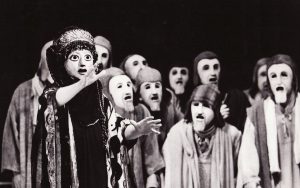Words on the Word
Palm Sunday
Isaiah 50.4-7: Each morning he wakes me to hear.
Philippians 2.5-11: Let the same mind be in you that was in Christ Jesus.
Luke 19.28-40: If these were silent, the very stones would cry out.
More than any other time of the year, Holy Week lets us experience the liturgy as sacred theatre. I think of ‘theatre’ here in the simultaneously most sublime and most concrete sense of the word, as a showing. I don’t think of Guys and Dolls so much as of theatre as we  encounter it in Antiquity, in Shakespeare or, for that matter, in Ibsen and Strindberg: this kind of theatre confronts us with profound, sometime dark, sometimes absurd, aspects of existence. Thereby it leads us, if we pay attention, to greater self-knowledge. What we see on stage prompts introspection. To go to the theatre isn’t chiefly about being entertained; it is about entering a dialogue. We are part of the drama that unfolds before our eyes; spectators, yes, but also participants.
encounter it in Antiquity, in Shakespeare or, for that matter, in Ibsen and Strindberg: this kind of theatre confronts us with profound, sometime dark, sometimes absurd, aspects of existence. Thereby it leads us, if we pay attention, to greater self-knowledge. What we see on stage prompts introspection. To go to the theatre isn’t chiefly about being entertained; it is about entering a dialogue. We are part of the drama that unfolds before our eyes; spectators, yes, but also participants.
The Church’s theatre normally sticks to strict rules. The liturgy of Mass follows an unchangeable pattern. Its texts and rituals reveal their significance over time. Predictability is called for. Constant improvisation distracts. After all, we haven’t come to discover the actors’ ego. What we want is the drama; the drama whose origin is not of this world, but which explains the world, leading us beyond ourselves and letting us see ourselves in the light of a more sublime order. That is how it normally is. But occasionally the Church bursts the boundaries she has established. She lets her drama spill beyond our churches’ walls, into our countryside and cities.
On Palm Sunday we proceed with singing into the centre of Trondheim like the Hebrews’ children back then in Jerusalem. We do not merely imitate them; we appropriate their confession. ‘Hosanna!’, we have cried; ‘Blessed is he who comes in the name of the Lord!’ When a moment ago I blessed our palms I prayed, with words put into my mouth by the Church, ‘that we, who follow Christ the King in exultation, may reach the eternal Jerusalem through him.’ Yes! That is how we wish to live. In this way we want our procession around the block to be an image of our whole earthly journey.
We do desire this. But do we live accordingly? The exultation of Palm Sunday is of short duration. For years I wondered why the Church lets us read the story of the passion today. After all, Holy Week has its chronology. It follows Christ’s Passion step by step, from the entry into David’s city through Judas’s betrayal and the institution of the Eucharist to the crucifixion and burial.
The Church, whose sense of dramaturgy is unsurpassed, tells us the story today by way of anticipation so that we may interpret each detail in view of the whole. This is how theatre works. When we go to see a new production of The Wild Duck, it isn’t with the hope that it might, finally, present us with a happy end. We know its unfolding. The task of the director and actors is to convey a known story in such a way that we, the public, are drawn from our customary superficiality into greater depth.
Today’s liturgy challenges us in this way. One moment we walk together with a spring in our step, happily singing Hosanna. There’s not doubting our sincerity. The next moment we stand silently before Pilate’s podium and hear him, the image of worldly might, put Jesus forward as an object at an auction while the crowd cries ‘as one man’: ‘Away with him! Give us Barabbas! Crucify him!’
Where is our loyalty now? Have we the courage, the strength to protest? Or do we howl with the wolves?
Palm Sunday shows us that the mere fact of being part of a majority, swept along by an arrogant crowd shouting simple slogans, is not necessarily to be in the right, or on the side of right. That is an important insight right now.
We are reminded, too, that a follower of Jesus must walk as he walked. That can lead us to be left standing apparently alone while the world about us shows its teeth.
In a powerful image, Isaiah says that each morning God ‘wakes me to hear, to listen like a disciple’. How does a disciple listen? Perseveringly. And patiently. ‘I made no resistance’, says the prophet, ‘neither did I turn back’. To be faithful is often a matter, quite simply, of staying put. Great gestures and rhetorical flourish are often not needed. What counts is to let our yes be yes, our no be no, no matter who we speak with; and to stand up publicly for truths we freely confess in private.
In the collect we pray in our Norwegian version [the English is better] that we might ‘learn from the suffering of Christ’. The translator clearly was in a rush. If we look up the prayer in Latin, the Church’s mother tongue, the resonance is different. The Latin for suffering is ‘passio’. Our prayer, however, speaks of ‘patientia’, a noun derived from the same root (‘patior’ = ‘I suffer’), but with a more immediate sense. We would spontaneously render it as ‘patience’. 
Christ’s via crucis shows us strikingly, shockingly with what patience God endures our fickleness, our arrogance. Do we respond to God’s patience with ours? Do we make his mighty works known, or do we leave it to the stones to cry out alone? In the drama of salvation we all have our role to play. And remember: this drama does not play itself out apart from the world’s. It is the drama we now enact liturgically that makes sense of the world’s drama. The drama is a tragedy. However, illumined by Christ it leads to a climax of life and hope. Unillumined it appears nihilistic.
The world has long since lost the plot. It acts without care, frenetically, often enough grotesquely.
Let us, then, learn our part well. It is of importance. There are no walk-on extras in this production. Face to face with the cross each of use plays a main part. We are called to be incorporated into Christ’s work of redemption, to show the world what it course signifies. We must learn to listen like a disciple in order, like a disciple, credibly to live. Amen.
Omnipotens sempiterne Deus, qui humano generi, ad imitandum humilitatis exemplum, Salvatorem nostrum carnem sumere, et crucem subire fecisti, concede propitius, ut et patientiæ ipsius habere documenta et resurrectionis consortia mereamur.
